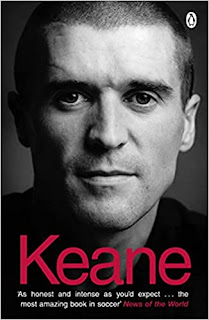Review: This, as stated in the title, is the autobiography of the Irish international footballer Roy Keane, written with the assistance of another former Irish footballer Eamon Dunphy. Roy Keane was born in Cork in Ireland and played professional football in the English and Scottish top divisions for Nottingham Forest, Manchester United and Celtic. He made 67 appearances for the senior Republic of Ireland team. Following periods in football management, he is probably best known nowadays as a television football pundit. The book was first published in 2002 whilst he was still a player with Manchester United (a follow up autobiography was published in 2014).
Roy Keane’s childhood in Cork is described, together with his progress in schoolboy football before starting his senior career with Cobh Ramblers in the Irish National League. From there, he was signed by Nottingham Forest before moving on to play for, and captain, Manchester United. He describes playing under such legendary managers as Brian Clough and Alex Ferguson. Known throughout his playing career as a tough, uncompromising midfielder, he was also noted for his volatile temperament. His disciplinary record was to cost him as the 1998-1999 season drew to a close, when a yellow card picked up in the semi-final of the European Champions League meant that he was suspended from the final when Manchester United achieved an historic treble by winning the Premier League, the FA Cup and the European Champions League. Throughout the book, it is apparent that he sets very high standards for himself and for others around him, and is quick to criticise when he believes those high standards are not being met. This came to a head just prior to the 2002 World Cup held in Japan and South Korea when he expressed his dissatisfaction with the facilities of Ireland’s training camp, leading to a falling out with the manager and his returning home without participating in the finals.
Roy Keane is clearly a very driven person, and this comes across in the book, which is an insight into his personality and some of the characters in professional football. It is illustrated with many colour photographs, although at times the captions of the photographs do not correspond with the text of the book. There are also a few factual errors in the book. For example, the family of the late Bob Paisley, a former manger of Liverpool, may be surprised to read that the Durham-born Paisley is described as a Scotsman. I should also add a care warning that there is a lot of strong language throughout the book. Despite this, I found it to be a fascinating account of one of football’s characters.

No comments:
Post a Comment